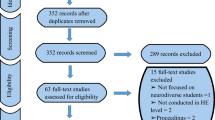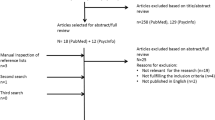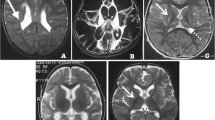Abstract
Purpose
There are some reports of so-called Alice-in-Wonderland syndrome mostly concerning differential diagnosis, association with a variety of infectious diseases and even some case reports on functional imaging. Long-term data are rare.
Methods
Nine boys aged 6 to 11 years that had been diagnosed with Alice-in-Wonderland syndrome between 2003 and 2008 were contacted for a long-term follow-up study in summer, 2009, with a mean follow-up of 4.6 years.
Results
At the time of the follow-up study, all children were in good general and mental health. Symptoms of Alice-in-Wonderland syndrome had ceased within weeks or months. In two patients, episodes of metamorphopsia returned after a symptom-free latency of 3 years and 1 year, respectively. Five children had a family history of migraine or epilepsy. In one case, the father was reported to have experienced similar symptoms when he was a child.
Conclusion
Our follow-up study shows that Alice-in-Wonderland is most likely a benign, self-terminating childhood condition, although occasional recurrences of symptoms are possible.
Similar content being viewed by others
References
Todd J (1995) The syndrome of Alice in Wonderland. Can Med Assoc J 73:701–704
Ho CS, Shen EY, Liaw SB, Huang FY (1992) Clinical observation and neurological outcomes in “Alice in Wonderland” syndrome. Zhonghua Min Guo Xiao Er Ke Yi Xue Hui Za Zhi 33:89–95
Lippmann CW (1952) Certain hallucinations peculiar to migraine. J Nerv Ment Dis 116:346–351
Caraballo R, Koutroumanidis M, Panayiotopoulos CP, Fejerman N (2009) Idiopathic childhood occipital epilepsy of Gastaut: a review and differentiation from migraine and other epilepsies. J Child Neurol 24:1536–1542
Hung KL, Liao HT, Tsai ML (2000) Epstein-Barr virus encephalitis in children. Acta Paediatr Taiwan 41:140–146
Kuo YT, Chiu NC, Shen EY et al (1998) Cerebral perfusion in children with Alice in Wonderland syndrome. Pediatr Neurol 19:105–108
Lahat E, Berkovitch M, Barr J et al (1999) Abnormal visual evoked potentials in children with “Alice in Wonderland” syndrome due to infectious mononucleosis. J Child Neurol 14:732–735
Liaw SB, Shen EY (1991) Alice in Wonderland syndrome as a presenting symptom of EBV infection. Pediatr Neurol 7:464–466
Hausler M, Ramaekers VT, Doenges M, Schweizer K, Ritter K, Schaade L (2002) Neurological complications of acute and persistent Epstein-Barr virus infection in paediatric patients. J Med Virol 68:253–263
Wang SM, Liu CC, Chen YJ, Chang YC, Huang CC (1996) Alice in Wonderland syndrome caused by coxsackievirus B1. Pediatr Infect Dis J 15:470–471
Evans RW (2006) Reversible palinopsia and the Alice in Wonderland syndrome associated with topiramate use in migraineurs. Headache 46:815–818
Takaoka K, Takata T (1999) ‘Alice in Wonderland’ syndrome and Lilliputian hallucinations in a patient with a substance-related disorder. Psychopathology 32:47–49
Hiemer S, Schoettler A, Kluger G et al (1998) Gibt es das Alice-im-Wunderland-Syndrom. In: Kohlschuetter A (ed) Bentele KHP. Aktuelle Neuropaediatrie. Novartis Pharma Verlag, Nuernberg, pp 425–428
Acknowledgements
We would like to thank the participating patients and their parents. This work was funded by the “Wagener-Stiftung für Sozialpädiatrie”, Emsdetten.
Author information
Authors and Affiliations
Corresponding author
Rights and permissions
About this article
Cite this article
Weidenfeld, A., Borusiak, P. Alice-in-Wonderland syndrome—a case-based update and long-term outcome in nine children. Childs Nerv Syst 27, 893–896 (2011). https://doi.org/10.1007/s00381-011-1400-6
Received:
Accepted:
Published:
Issue Date:
DOI: https://doi.org/10.1007/s00381-011-1400-6




